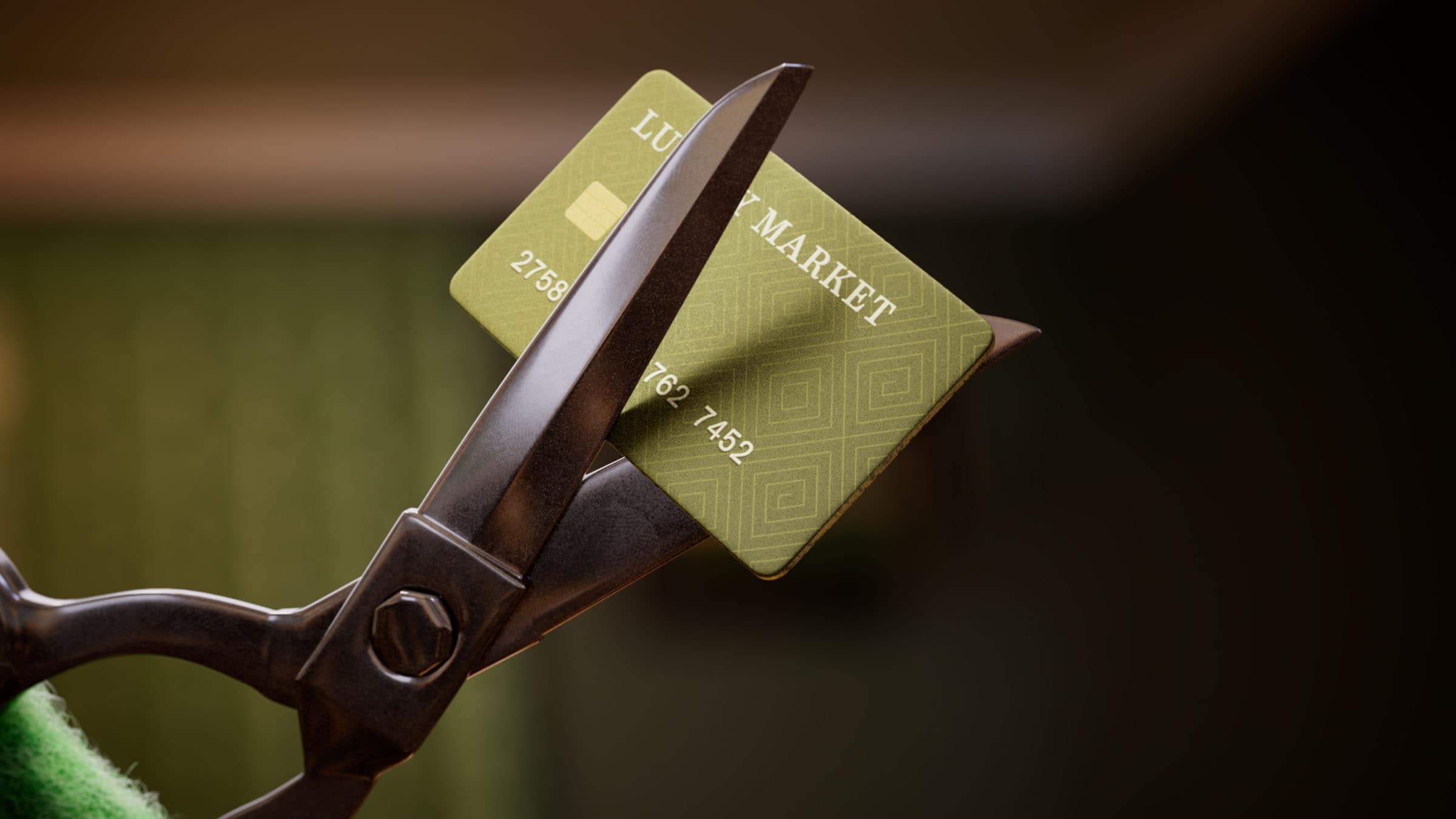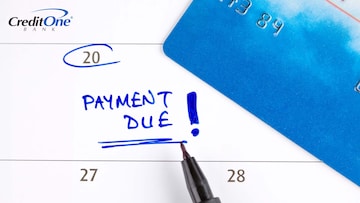
Does Closing a Credit Card Hurt My Credit Score?
October 01, 2025
Your credit card is part of your financial ecosystem. Closing it can affect your score, so it’s important to understand the repercussions before you do.

In this article:
- Introduction
- What Factors Influence Your Credit Score the Most?
- The Role of Credit Utilization and Available Credit
- Is It Bad To Close a Credit Card? Understanding the Real Impact
- When It Might Be Smart To Close a Credit Card
- How To Close a Credit Card Properly
- Strategies To Minimize Score Damage
- Bottom Line
Introduction
When you’re trying to simplify your finances, get your budget on track, and keep your spending under control, canceling a credit card might seem like a smart move. But closing that account can impact your credit score in several ways.
Even if it’s fully paid off and unused, shutting down a credit card account can affect the length of your credit history, your credit utilization, and your credit mix. So before taking out the scissors to cut up your plastic, it’s worth understanding the potential downsides.
What Factors Influence Your Credit Score the Most?
Your credit score is built on several elements, but some carry more weight than others. The factors with the biggest impact on your credit score include your payment history, your credit utilization ratio, your length of credit history, the type of credit used, and your recent credit inquiries.
Among those, payment history and credit utilization tend to have the biggest effect. Closing a card with a high credit limit reduces your total amount of available credit, and that raises your credit utilization ratio — which is the proportion of what you owe compared to your total credit limit.
The Role of Credit Utilization and Available Credit
One of the most important numbers related to your credit health is your utilization ratio, or how much of your credit lines you’re currently using. It’s a snapshot of your borrowing behavior, and lenders pay close attention to it.
Available credit is the other side of the coin — the amount you have open for spending beyond your current balance. So if you’ve charged $200 to a $1,000 credit line, your utilization ratio on that account is 20% and you have $800 left in available credit.
When you close a card, you erase that portion of your available credit. This causes the aggregate utilization across all your credit lines to spike, making you appear more reliant on borrowed money than you actually are.
You can improve your credit score by keeping your utilization low. Using no more than 30% of your available credit is the recommended goal, and less than 10% is even better. So if closing a card sends you above those thresholds, your score may decrease.
Is It Bad To Close a Credit Card? Understanding the Real Impact
Closing a credit card isn’t inherently “bad,” but it does come with a few potential consequences. Canceling a credit card impacts your average account age, credit mix, utilization, and total amount of credit available to you — all of which directly or indirectly influence your credit score.
When you close a card that’s been open for many years, you’ll likely reduce the average age of your credit accounts. That long-standing account proved your reliability over time, and deleting it shortens your track record. If you have loans but very few credit cards, it can also throw off your credit mix.
Meanwhile, losing a card’s available credit can increase your utilization ratio, especially if you carry balances on your other cards. If your credit profile is otherwise thin, those small changes can add up to a bigger difference.
So when we combine the shorter credit history, increased utilization, and reduced credit mix, closing a credit card will very likely lower your credit score.
However, missed or late payments always look worse than closed accounts in your credit report, and can stay there for up to 7 years. So if keeping the account open will tempt you to make purchases you can’t afford, or result in not being able to pay on time, it may be better to close it.
When It Might Be Smart To Close a Credit Card
Despite the consequences, you might have valid reasons to close a credit card. Perhaps the card has a rewards structure that no longer matches your lifestyle and shopping habits. Or you can’t justify the annual fee anymore because you don’t use the benefits enough. If you’re confident that your credit score can absorb the change, paying just to keep a card open may not be worth it.
Some people feel overwhelmed by having too many open accounts. You might also want to close a card that you opened during an emotionally or financially unstable time, or a joint account after you’ve separated from your partner. There’s no harm in moving on from the past, as long as you understand the trade-offs.
Fraud concerns are another reason to cancel. If you’ve been targeted for identity theft or had your information compromised, shutting down unused or vulnerable cards can give you peace of mind.
How To Close a Credit Card Properly
After weighing all the pros and cons, if you still feel that canceling a credit card account is in your best interest, it’s important to do it the right way.
Redeem your rewards: If you’ve accumulated any points, miles, or cash back rewards, be sure to use them before you shut down the account. Rewards are usually forfeited when you cancel the card.
Update recurring payments: If you use the card for subscriptions, utility bills, or other automatic payments, switch those to another card. Otherwise, you might face bounced payments, missed bills, and penalty fees.
Pay off your full balance: Closing a card with a balance doesn’t erase the debt, so make sure your account is completely paid in full. That includes not just the latest statement balance, but any pending transactions or fees that may not be posted to your account yet.
Contact your card issuer: Always follow the specific account-closing instructions from the issuer. You can call customer service and have them walk you through the process, or ask them to triple-check for a zero balance on your card before closing it.
Destroy the card: To protect yourself against identity theft and avoid accidentally using your canceled card, dispose of it by shredding or cutting it up. Metal cards can be mailed back to the issuer.
- Review your credit report: Wait for at least one billing cycle to pass, and then check your credit report for accuracy. Your closed account should show that you took the action, not the issuer. If you find mistakes, you can file a dispute to have them removed.
Strategies To Minimize Score Damage
If you decide to pull the trigger and cancel a credit card, it’s still possible to lessen the impact on your credit score. The key is timing and preparation.
Pay down balances first
Before closing a credit card, try to pay off or significantly reduce the balances on your other cards. This lowers your overall utilization and gives your score some cushion when you remove available credit from the equation.
Wait until after major purchases
If you’re planning to apply for a car loan, mortgage, or new line of credit, you don’t want to close a card immediately beforehand. That can give lenders the impression that you’re reducing your debt obligations to avoid financial strain. It also removes a layer of predictability from your profile at a time when consistency is important.
Instead, make the new loan application when your credit is solid so you don’t have to worry about being hit with higher interest rates or loan approval issues. Then allow your score to stabilize before shaking it up again with a closed account.
Keep older cards open when possible
Your oldest accounts help establish the length of your credit history. If the card has no annual fee and doesn’t tempt you into unnecessary spending, consider keeping it open. You might also be able to switch from a rewards card with an annual fee to a basic no-fee card so you can keep the history without paying fees.
Even letting a card sit unused can quietly benefit your credit profile, as long as you make occasional purchases so it doesn’t get closed for inactivity.
These simple strategies will likely help reduce any negative effect you might get from closing an account — especially if you implement other ways to avoid lowering your credit score during the process. While none of them can completely erase the impact, they each give you a better chance of maintaining your score. And together, they work even harder to lessen any potential damage.
Bottom Line
Whether or not you choose to close one of your credit cards is a personal decision. If you’re trying to cut down on spending or simplify your finances, this could be a good move. But it’s important to keep in mind how it might affect your financial life, including your credit score.
If you’ve closed a credit card in the past and would like a new one to round out your credit mix or decrease your credit utilization ratio, look for one that allows you to pre-qualify before applying. This process gives you a good idea of your chances for approval and doesn’t impact your credit score.



